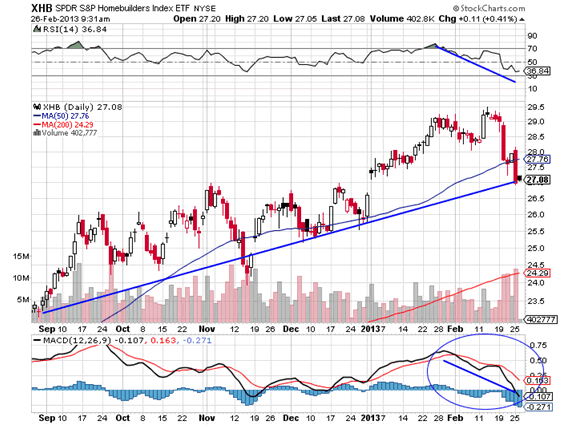Is a Bubble Developing in U.S. Housing Market?
Housing-Market / US Housing Mar 01, 2013 - 07:11 AM GMT George Leong writes: Recently in these pages, I talked about how the government, the Treasury, and the Federal Reserve were creating an artificial economy that was supported by cheap money and low interest rates.
George Leong writes: Recently in these pages, I talked about how the government, the Treasury, and the Federal Reserve were creating an artificial economy that was supported by cheap money and low interest rates.
One of the major benefactors of this cheap money was the housing sector, which is now sizzling hot. The median price of an existing home in the U.S. was $173,600 in January, up 12.3% from an average of $154,600 a year earlier. (Source: United States Census Bureau web site, last accessed February 27, 2013.)
Driving the renewed buying in the housing sector has been the environment of near-zero interest rates. The Federal Reserve has been injecting additional liquidity into the economy and mortgage market via its $85.0 billion in monthly bond purchases. The problem is that the low interest rates and easy money have driven the excess buying of homes and investment properties, as speculators jump into the housing sector, looking for deals and driving up home prices.
My concern is that the buying may be creating another potential bubble in the housing sector. You may not believe it, but I view this as a possibility. Housing starts in January showed some stalling. And now, with the $1.2-trillion “sequestration” budgetary cuts set to take effect tomorrow, the automatic $85.0 billion in annual budget cuts could have a widespread impact on the country and the economy, including program cuts, job losses, and economic chaos. The Congressional Budget Office (CBO) has warned that the U.S. economy could contract by 1.3% in the first half of this year if the sequester is allowed to take hold.
So let’s assume the sequestration does occur. With the associated likelihood of slowing in the economy, the Fed may have little choice but to maintain its low interest rate policy. The aftermath could be more buying in the housing market, but given the expected impact on jobs and the economy, we could be set for softness in the housing sector.
Home prices, representing another key piece of the housing sector, are edging higher; the S&P/Case–Shiller U.S. National Home Price Index, comprising the 20 largest U.S. metropolitan cites, increased a better-than-expected 6.8% in December, representing the eleventh straight up month.
While the higher prices suggest a healthier housing sector, I’m concerned with the fact that the rebound has largely been driven by low interest rates. What will happen to homeowners and speculators when interest rates begin to ratchet higher?
Here, you will have homeowners and investors, faced with higher payments, who may be forced to liquidate. The problem is that if many do this, it would create a bubble in the housing sector.
The chart of the SPDR S&P Homebuilders (NYSEArca/XHB) index below shows the upward trend in the housing market from the October 2011 bottom to its high just prior to the relapse. Technical indicators in the chart point to more potential downward moves to come.

Chart courtesy of www.StockCharts.com
While I’m not saying a housing sector bubble is inevitable, I am saying that there is a chance it could happen. As such, you want to be prepared for this possibility.
An investment strategy is to buy exchange-traded funds (ETFs) in housing that make money when the sector weakens. A couple of examples of ETFs you might consider are ProShares Short Real Estate (NYSEArca/REK) and Direxion Daily Real Estate Bear 3X Shrs (NYSEArca/DRV).
Source:http://www.investmentcontrarians.com/real-estate/is-a-bubble-developing-in-housing/1508/
By George Leong, BA, B. Comm.
www.investmentcontrarians.com
Investment Contrarians is our daily financial e-letter dedicated to helping investors make money by going against the “herd mentality.”
George Leong, B. Comm. is a Senior Editor at Lombardi Financial, and has been involved in analyzing the stock markets for two decades where he employs both fundamental and technical analysis. His overall market timing and trading knowledge is extensive in the areas of small-cap research and option trading. George is the editor of several of Lombardi’s popular financial newsletters, including The China Letter, Special Situations, and Obscene Profits, among others. He has written technical and fundamental columns for numerous stock market news web sites, and he is the author of Quick Wealth Options Strategy and Mastering 7 Proven Options Strategies. Prior to starting with Lombardi Financial, George was employed as a financial analyst with Globe Information Services. See George Leong Article Archives
Copyright © 2013 Investment Contrarians- All Rights Reserved Disclaimer: The above is a matter of opinion provided for general information purposes only and is not intended as investment advice. Information and analysis above are derived from sources and utilising methods believed to be reliable, but we cannot accept responsibility for any losses you may incur as a result of this analysis. Individuals should consult with their personal financial advisors.
Investment Contrarians Archive |
© 2005-2022 http://www.MarketOracle.co.uk - The Market Oracle is a FREE Daily Financial Markets Analysis & Forecasting online publication.



